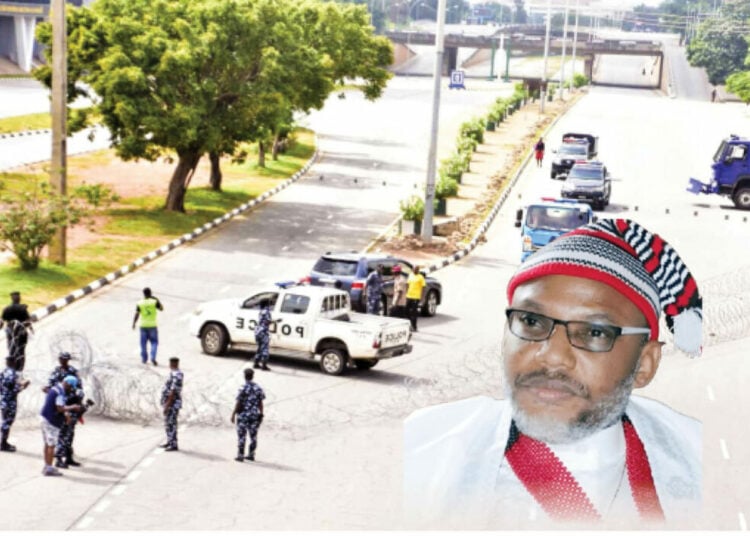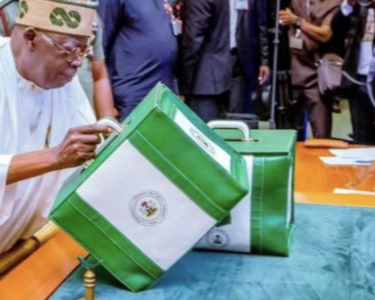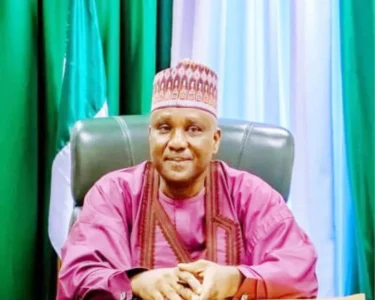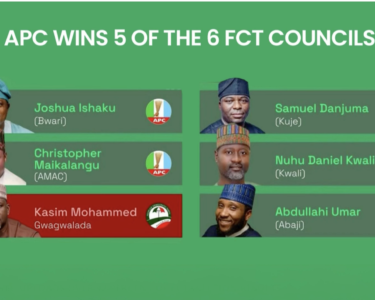Civil society groups across Nigeria have strongly condemned the crackdown and arrest of protesters demanding the release of Nnamdi Kanu, leader of the Indigenous People of Biafra (IPOB). The demonstrations, held in several states including Abuja under the banner #FreeNnamdiKanuNow, were met with a forceful response from security operatives.
Security agents reportedly dispersed demonstrators who gathered at multiple locations in Abuja to protest Kanu’s continued detention.
Background and Legal Timeline
Kanu was first arrested in October 2015 on terrorism-related charges. He later fled the country in 2017 after a military raid on his residence while on bail. His bail was revoked in March 2019, and a warrant was issued for his re-arrest.
In 2021, the federal government confirmed his re-arrest. A year later, in 2022, the Court of Appeal ordered the charges against him to be dropped — but that decision was overturned by the Supreme Court in 2023.
Protests and Police Response
The protest in Abuja was led by Omoyele Sowore, convener of the #RevolutionNow movement and former presidential candidate of the African Action Congress (AAC). Beginning as early as 6:50 a.m., Sowore and other activists gathered near the Ministry of Women Affairs, demanding Kanu’s release. He described Kanu’s prolonged detention as an “injustice,” particularly when compared to the government’s leniency toward individuals accused of serious crimes.
Security forces, comprising personnel from the Nigerian Police Force, DSS, Guards Brigade, and NSCDC, used tear gas to disperse the demonstrators in the city centre. Roadblocks were also mounted around the Presidential Villa, National Assembly, Court of Appeal, and Eagle Square, causing heavy traffic congestion across the capital.
Amid the chaos, Emmanuel Kanu (Nnamdi Kanu’s younger brother) and Aloy Ejimakor (his lawyer) were arrested. Sowore, in a post on his X (formerly Twitter) handle, alleged that the police used live ammunition and excessive force against peaceful protesters, demanding the immediate release of those detained.
Police Reaction and Legal Context
The Nigerian Police had earlier warned against holding protests in restricted areas of the capital city. According to Force PRO, CSP Benjamin Hundeyin, a court order bars groups from staging demonstrations around sensitive government facilities.
Hundeyin denied that live bullets were fired, insisting that only tear gas was used to disperse the crowd.
IPOB, which Kanu leads, was proscribed as a terrorist organisation in 2017, and its armed affiliate, the Eastern Security Network (ESN), has been accused of violence and targeted killings in parts of the South-East.
Civil Society and Media Reactions
Several civil society organisations have condemned what they described as a “brutal suppression” of peaceful protesters.
Auwal Ibrahim Musa (Rafsanjani), who leads both the Civil Society Legislative Advocacy Centre (CISLAC) and Transparency International Nigeria, criticised the use of force against demonstrators. He said:
“If the government channels the same energy used against peaceful protesters towards fighting criminals and terrorists, Nigerians would be safer. We do not support violence or unlawful arrests; we believe in dialogue and engagement, not coercion.”
The Grassroots Centre for Rights and Civic Orientation (GRACO) also expressed dismay over the detention of citizens exercising their right to protest, while CREAP Africa Initiative, led by Sylvanus Udoenoh, described the harassment of peaceful demonstrators as a violation of constitutional freedoms.
The Nigeria Union of Journalists (NUJ), FCT Council, condemned the arrest and assault of Agence France-Presse (AFP) journalist John Okunyomih, whose equipment was damaged while covering the protest near Unity Fountain. The union described the act as “a gross violation of press freedom and democratic principles.”
In a similar statement, CISLAC Programme Officer, Gimba Suleiman, reiterated the organisation’s position that peaceful protest is not a crime.
“It is an essential civic tool for citizens to express dissent and demand accountability in a democracy,” he said, warning that arbitrary arrests and assaults erode public trust in state institutions.
Academic and Gender Perspectives
Dr. Christian Okeke, a political science lecturer at Nnamdi Azikiwe University, criticised the government’s increasing intolerance for peaceful protests, saying it contradicts democratic values.
“It’s unfortunate that in a democracy, citizens can’t freely express grievances without being met with force,” he said.
Comrade Okeke Amarachi, coordinator of the Women’s Inclusion, Empowerment and Leadership Development Initiative (WIELD-I), urged both citizens and security forces to act responsibly.
“Citizens have a constitutional right to protest peacefully, and security operatives must enforce order with restraint and respect for human rights,” she stated.
Protests Spread to Anambra
In Anambra State, the Sowore-led protest brought daily activities to a standstill. Markets, banks, schools, and petrol stations in Awka, Onitsha, Nnewi, and Ekwulobia remained closed.
Even a political rally for Governor Chukwuma Soludo saw poor attendance as residents stayed off the streets in solidarity.
Diaspora Group Demands Release
The American Veterans of Igbo Descent (AVID) condemned the arrests of Emmanuel Kanu, Aloy Ejimakor, and others, describing the actions as “a grave assault on democracy.”
Dr. Sylvester Onyia, AVID president, said the arrests violated both local and international human rights laws.
“Peaceful protest is not a crime. Even during military rule, Nigerians had the courage to speak out. It is unacceptable that under democracy, citizens are teargassed and arrested for demanding justice,” Onyia said.
He called on President Bola Tinubu to uphold the rule of law and ensure accountability within security agencies.
Presidency Responds
Reacting to the protests, Presidential Adviser on Media and Public Communication, Chief Sunday Dare, warned that judicial matters should not be influenced through public agitation.
“Justice is determined in courtrooms, not on the streets,” Dare said on his verified X handle, adding that protests and threats cannot override judicial processes.
He reminded Nigerians that Kanu’s case predates the Tinubu administration and remains under judicial consideration.
“Freedom and democracy have limits. Testing those limits will attract the full weight of the law,” Dare cautioned.
Tear Gas in Port Harcourt
In Rivers State, police officers dispersed suspected IPOB members attempting to stage a protest along Olu Obasanjo Road in Port Harcourt. Witnesses said tear gas was fired, forcing protesters to flee.
Conclusion
The nationwide crackdown on #FreeNnamdiKanuNow protesters has reignited debates about freedom of expression, civic participation, and the state’s commitment to democratic principles.
While security agencies insist they acted within the law, rights advocates warn that continued repression could further alienate citizens and deepen mistrust in government institutions.




